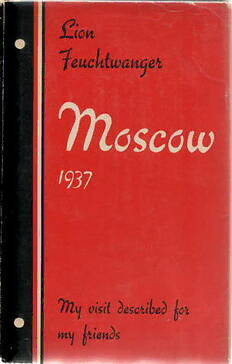
Moscow 1937: My Visit Described for My Friends PDF
Preview Moscow 1937: My Visit Described for My Friends
MOSCOW 1937 Printed in Great Britain by The Camelot Press Ltd., London and Southampton CONTENTS Foreword page 7 I. Work and Leisure 15 II. Conformism and Individualism 46 III. Democracy and Dictatorship 74 IV. Nationalism and Internationalism 97 V. War and Peace 106 VI. Stalin and Trotsky 114 VII. The Explicable and the Inexplicable in the Trotskyist Trials 133 VIII. Hatred and Love 164 FOREWORD A c t u a l l y , this account should bear the title: “ Moscow, January 1937,” for things are moving so quickly in Moscow that many obser vations lose their truth in a very few months. I met people there who knew their Moscow well, but who hardly recognised their own city when they saw it again after an absence of six months. Nevertheless, I am writing down The object “ Moscow 1937,” and I am allowing myself»,$1 ^ this latitude because it is not my intention to present a precise objective picture. To attempt as much after a ten-weeks’ visit would be absurd. Rather shall I merely give my own personal impressions for those of my friends who may be anxious to know what I thought of Moscow and what I saw there. Since, therefore, I am fully aware that the conclusions I am setting forth are entirely personal, I am at once indicating the hopes and fears which accompanied me on my visit 8 Moscow 1937 to the Soviet Union, leaving it to the reader to assess how far my vision was coloured by my feelings and preconceived ideas. I set out as a sympathetic visitor. I sympa thised inevitably with the experiment of basing the construction of a gigantic State on reason alone, and I went to Moscow hoping that the The creed of reason experiment was succeeding. However little I wished feelings and the spirit of criticism to be eliminated from the private lives of individuals, and however barren appeared to me a purely rational existence, I was as completely con vinced that if a social system is to prosper, it must be built up on judgment and reason. We in Central Europe have experienced with horror what happens when States and laws are based upon prejudices and passions in the place of reason. I have never been able to look upon world history in any way other than as a bitter and unceasing struggle waged by a thinking minority against a stupid majority. I have always ranged myself on the side of reason, and it was thus inevitable that I should sympathise with the gigantic experiment which is being conducted from Moscow. Yet, from the first my sympathies were mixed FOREWORD 9 with doubts. Practical Socialism could only be established by means of the dictatorship of one Doubt and class: and it followed that the Soviet Union mistrust was a dictatorship after all. But since I am a writer, and that because I must be, I am driven from within to give unrestricted expression to what I feel, think, see, and experience, regard less of individuals, class, party, or ideology. And so, despite my personal leanings, I was mistrustful of Moscow. True, the Soviet Union had drawn up a free and democratic constitu tion, yet I had heard from credible sources that in practice this freedom had been badly dis torted, and my doubts were confirmed by a little book of André Gide’s which appeared just before my departure. So I arrived at the Soviet frontier sympa thetic, curious, and doubting. The honours with which I was received in Moscow served to increase my uncertainty. Good friends of mine, and, moreover, quite intelligent indivi duals, had had their judgment clouded by the First impres sions and effusiveness of the German Fascists, and I Potemkin wondered whether for me, too, the appearance villages of men and things was not being distorted by personal vanity. Then, again, I told myself, I Moscow IO 1937 should certainly only be allowed to see the successes, and it would be difficult for me, ignorant of the language as I was, to penetrate the surface and see beyond any veil which it might be necessary to arrange for my benefit. On the other hand, in Moscow one could Fault- quite easily be led to an unjustifiably adverse totfckof opinion, by the many minor discomforts which comfort make daily life difficult there and be blinded to the important things. Very soon I realised that even so eminent a writer as André Gide had had his judgment warped by petty annoyances of this kind. And I, too, found it most difficult while in Moscow to remain impartial and prevent the amenities or annoyances of the moment from influencing me unduly in one direction or the other. Often, too, the naïve pride and enthusiasm of the Soviet people made it harder for me to arrive at a fair and well-balanced estimate. The civilisation of the Soviet Union is young, built up amidst unexampled struggles and privation, and when there comes to the people of Moscow a guest to whose opinions they rightly or wrongly attach importance, they immediately ply him with questions as to how
